They prowl in the night… lurking in alleyways… They pose for stock photos in front of computers with a hammer in hand and a striped shirt on…
I’m talking about scammers, of course! We only love roguish hustlers when they’re played by George Clooney or Brad Pitt. Real-life travel scams are a lot simpler than Ocean’s 11 type heists, yet it’s still easy to fall for them!
By now, most of us are probably savvy enough to avoid getting swindled by classic phishing emails or Nigerian princes. Even the best of us have lapses of judgment every once in a while, though, and you’re especially vulnerable when you’re travelling.
Crooks love to target tourists for two reasons:
- They’ve travelled away from their country = they must have money.
- They’re dumb (well, some of them).
As a backpacker, your guard is probably down as you’re trying to enjoy yourself and befriend locals in search of unique adventures. You’re probably a little lost, and you might not know the language.
If something seems a little fishy, it’s easy to chalk the gut feeling to just being somewhere foreign. ‘Maybe that’s just how things work around here’, you think, as the taxi driver casually explains that your hotel is actually on fire and that he has a better place for you to stay.
When you learn to recognise the most common travel scams around the world, it’s easier to avoid them. Here are some of the top swindles aimed at tourists.

Pickpocketing Scams
Common in: Big cities everywhere
Okay, technically getting pickpocketed is not a tourist scam, that’s just some good old sleight of hand. Some petty thieves like to amp the theft up to the max, though – turns out there are a few more twists and turns to getting robbed, after all.
The Sauce Trick
The oldest trick in the Book of Deception is distraction.
This trick involves a hit-and-run with a rogue bottle of ketchup. (Or mustard, or soap, or anything yucky and sticky.) Once your lapels have been appropriately seasoned, a concerned bystander will come help you get cleaned up.
Except that the bystander is in on the trick with the sauce-ress, and while they’re helping you get cleaned up, they’re also patting you down and emptying your pockets.
A good way to protect yourself from pickpockets is to add a money belt to your travel packing list. Even the most acrobatic fingers can’t get your cash from there.
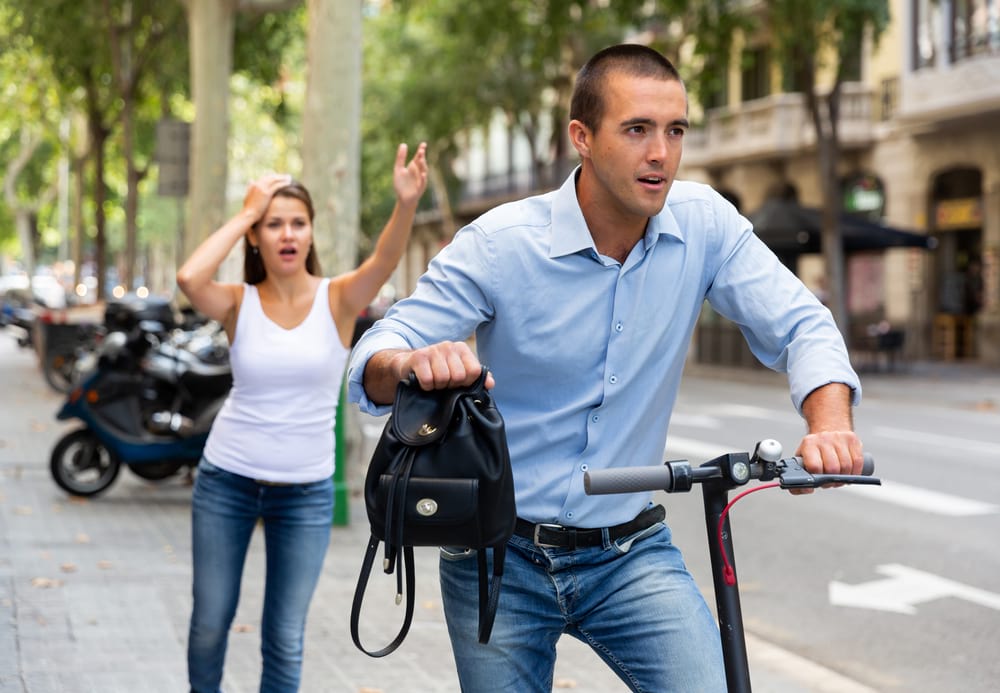
Pickpocketing Warning Signs
In a very meta move, pickpockets are often the ones putting up signs warning of pickpockets in the area.
There’s some legit psychology behind that. When you see a sign warning you of pickpockets, you feel compelled to check if all your valuables are safe. Petty thieves will be lurking in the shadows, though, taking note of where you keep your wallet or phone. This will make it easier for them to nick your knick-knacks later.
Lost Wallet
This one is similar to the sign trick. Someone will approach you with a wallet in hand and ask if you dropped it. This makes you instinctively check the place where you keep your wallet. Conveniently high beaming the route to your secret hiding spots for thieves!
A savvy backpacker makes themselves a difficult target by learning how to hide their cash.

Unlock Our GREATEST Travel Secrets!
Sign up for our newsletter and get the best travel tips delivered right to your inbox.
Taxi Scams
Common in: Southeast Asia
Getting cheated by seedy taxi drivers must be one of the most common bonding experiences for travellers. Here are some of their sneakiest tricks:
Broken Meter
The driver will tell you that the taxi meter is broken. But no worries! They quote you a flat rate that’s extortionately more than it should be. It’s best to tell them you’ll get another ride.
Even if they double down and agree to turn on the meter, it’s probably smarter to get another car anyway: they might have more tricks up their sleeve. See next point:
Broken Meter, Actually
Taxi drivers also do like to rig their meters so that it runs faster than it should and racks up a hefty bill in the end.
Picking a Longer Route
By taking a longer route to the destination, the driver is again racking up more minutes in the meter than needed.
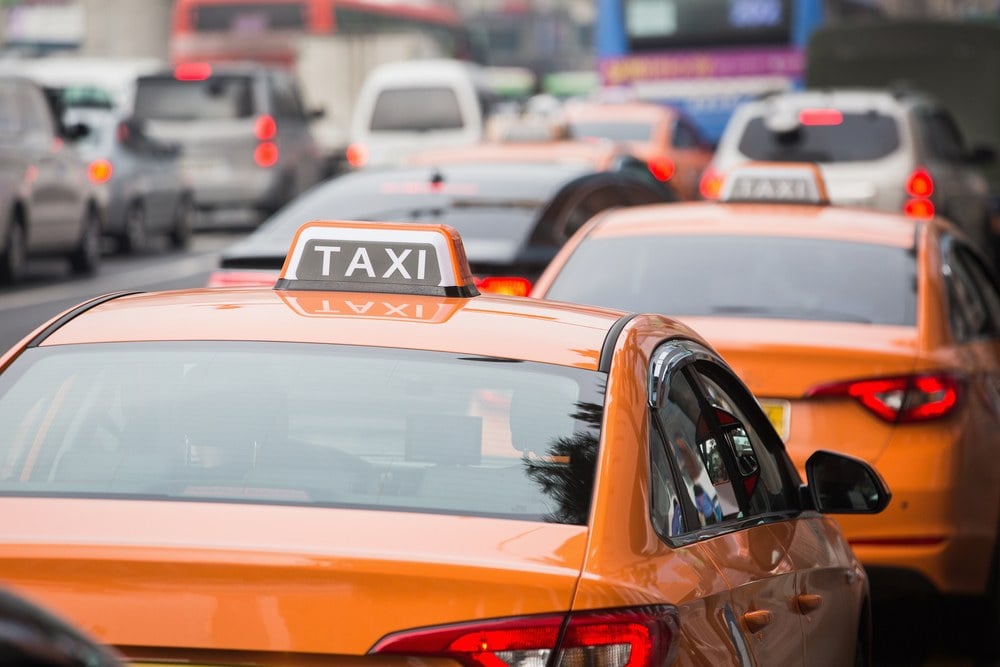
Best way to avoid getting scammed by a seedy cabber? Take an Uber or equivalent, when possible. If not, make sure you agree on the price of the ride beforehand. You can also figure out what the right rate should be (you can ask your hostel about this!) and insist that that’s around what you pay.
Falling for scams or not, travelling is precarious business. Never leave home without travel insurance!
It can save your person, it can save your personal goods, but it always pays to pay to cover your ass with some proper travel insurance — like World Nomads!
World Nomads’ mission is to support and encourage travellers to explore their boundaries. They offer simple & flexible travel insurance, and safety advice to help you travel confidently.
They’ve been doing it since 2002 – protecting, connecting, and inspiring independent travellers just like you.
Get a quote below or read our in-depth review!
World Nomads provides travel insurance for travelers in over 100 countries. As an affiliate, we receive a fee when you get a quote from World Nomads using this link. We do not represent World Nomads. This is information only and not a recommendation to buy travel insurance.
Money Exchange Scams
Common in: Pretty much everywhere
Ah, now this is where the money’s at – literally.
Money exchange scams are some of the most common pitfalls of trustful travellers. They rely on an almost-universal human inability to do maths. (I’m a part of the math-dumb club, too.)
Change Switcheroo
When you pay for a taxi or a souvenir, you hand the vendor a large note. Of course – you’ve just arrived and you have no small bills in your pocket. The vendor goes to give you change, then looks at the bill and proclaims that you gave them a 10, not a 100, and you need to pay more. In reality, they’ve deftly switched the note you gave them to a smaller one.
This happened to me in an airport cab in Bangkok. I was extremely jet-lagged, didn’t know the money yet – and did I mention I’m really bad at math? That ride cost me ten times more than it should have.

Shady Exchange Offices
Famously, exchange offices charge a small fee for converting your dollar-dollar-bills-yall to the local money. Some of them like to add their own deception tax on top of it.
Always make sure that you’re getting approximately the right amount of money out of your exchange. You can use online currency exchange calculators like xe.com or wise.com (prev. TransferWise) to make sure that you’re being quoted the right sum.
Skimming Machines
Scammers gonna scan. Criminals install skimming machines directly into ATMs or skim your credit card through your bag on the street using a discreet scanner. These devices allow them to steal the card’s details.
The easiest ways to avoid this are A) only use official bank ATMs, preferably in bank premises, and B) get a RFID blocking wallet or a card for your wallet that blocks some skimmer devices.
Experience in Shady Dealings: Money Exchange Scam on the Iranian Border
Foreign bank cards don’t work in Iran so I had to bring a stack of crisp US dollars with me and exchange it into rial as I went. Money in Iran is complicated and the nominations ridiculous. No wonder it’s easy to confuse tourists!
So there I was, in a seedy hole-in-a-wall border exchange office, surrounded by a group of Iranian guys counting bills out loud, hitting the stack on the desk. ‘- five, six, seven! Okay? Okay!’ But something didn’t add up – literally. My cash should have been twelve million, but about four million and a bit lay on the table.
The man pointed at two 500,000 rial bills, then one 100,000 rial bill, as if 500+500=100. Confused, I kept counting the notes. I thought I had miscalculated the zeros before I realised he was trying to bamboozle me.
That must be the stupidest travel scam in the books. It would be so easy to just misquote an ignorant tourist a false exchange rate – but to rely on them not knowing 1st grade maths, well, that’s a bold move. I’m glad I’m not six years old, smelled the sham, and “saved” about 60 dollars.
Friendly Travel Scams
Common in: Asia, Eastern Europe
If a stranger is overly friendly to you, your guard should go up. It’s easy to get lured in by a backpacker’s innate craving to make “real connections” with “cool local people”. You have to learn to trust your gut on who’s actually being nice and who’s just trying to get your hard-earned cash.
The Bar Trick
On a night out, you meet a friendly bunch of locals. This swindle usually targets young men, and the new friends are hot girls who flirt with them and take them to their favourite bar. The bar doesn’t have a name at the door (which is already kinda suss) but you know… adventure!
At the bar, you start ordering drinks and have a wonderful time – until the ladies disappear and change into big, scary guys with a 5,000 dollar bar bill. This act is especially common in Turkey and Eastern Europe.

Greedy Guides
Common around popular tourist attractions. A guy approaches you and offers to show you around. He might or might not tell you it’s for free – it doesn’t matter because at the end of the tour, there will be some sort of a subtle-or-not plea for money anyway.
Many travellers actually willfully fall for this one because these guides do provide useful information even if it isn’t for free. However, usually, these types are unofficial and unlicenced guides, so you have to consider if you’re being an ethical backpacker by supporting that.
Teahouse Scam
Similar to the bar trick but with less of a hangover. There are two common versions.
First, a couple of students will start chatting to you on the street, then invite you to a teashop so that they can practice their English with you. But of course at the end you’ll be stranded with an outrageous bill.
The second version of this swindle is an invitation to a sacred tea ceremony which sounds cool – until your new friends suggest that you should leave a HUGE donation to the temple in exchange for the ceremony.
You’ll most likely encounter teahouse scams while backpacking in China and South Korea. In Korea, you should be extra wary, since some of these deception artists are thought to be cult members.
Beware: Airbnb Scams
Everything is not always what it seems online. As Airbnb has become more and more popular, shams on the website have also become more common. Here are some top travel scams around the world that affect Airbnb guests:
- Fake reviews
- Owner asks for payment outside of the website
- Listing has the wrong pictures
- Fake damages
But there’s more! Be sure to learn how to avoid the most common Airbnb scams.
Souvenir Scams
All righty, let’s talk about two types of souvenir hoaxes.
Free Souvenirs
This ruse involves someone handing you a souvenir “for free” as a sign of friendship. This can be an old woman with a bouquet of roses or a nun handing out rosemary outside of a church, or a friendly street vendor tying a bracelet on your wrist. Then comes the demand for payment which will be many times the actual value.
A famous version of the free souvenir swindle involves a lost ring. It’s one of the most common travel scams in Europe. The innocent target finds a golden ring on the street and the swindler approaches them. They tell you that oh my gosh, that’s a really valuable ring! Pure gold! Luckily they’re willing to sell it to you for a very low price, and you get to take the main cut.
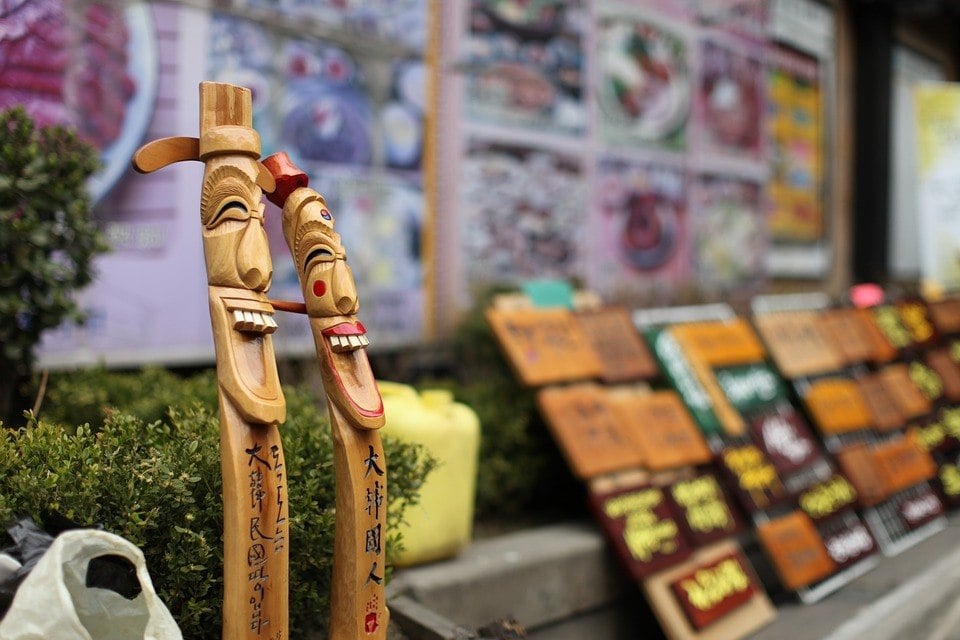
Of course the ring is a worthless kitsch. And also, why would you pay some guy on the street for a thing YOU found?
There is no such thing as a free lunch! Strangers on the street don’t dole out things for tourists out of the kindness of their hearts.
Fake Souvenirs
It is just what it says. In many countries, anything cool and special (usually antiques and handicrafts) is marketed to tourists as a unique souvenir. Often the vendors claim that they themselves or their family member has made the wares. In truth, they’re mass-produced somewhere else and passed off as handicrafts.
In many places where people like to shop for mementos from past times, fake antiques are also sold. Buying antiques is tricky business since you often need a special permit to take the stuff out of the country, so if the seller claims you don’t need that, the wares might be fake. You can also ask for a certificate of authenticity for real antiques.
Tourist Scams in India
I just HAD to include this as its own section. Backpacking India is always memorable: intense, adventurous, and INSANE.
India is well known as a scam capital of the backpacking world. You gotta stay on your guard all the time. While I met some of the loveliest human beans ever while there, I also ran into lots of folks who didn’t seem to see me as a human. Maybe it was because I was a woman, maybe because I had suddenly turned wallet-shaped in their eyes.
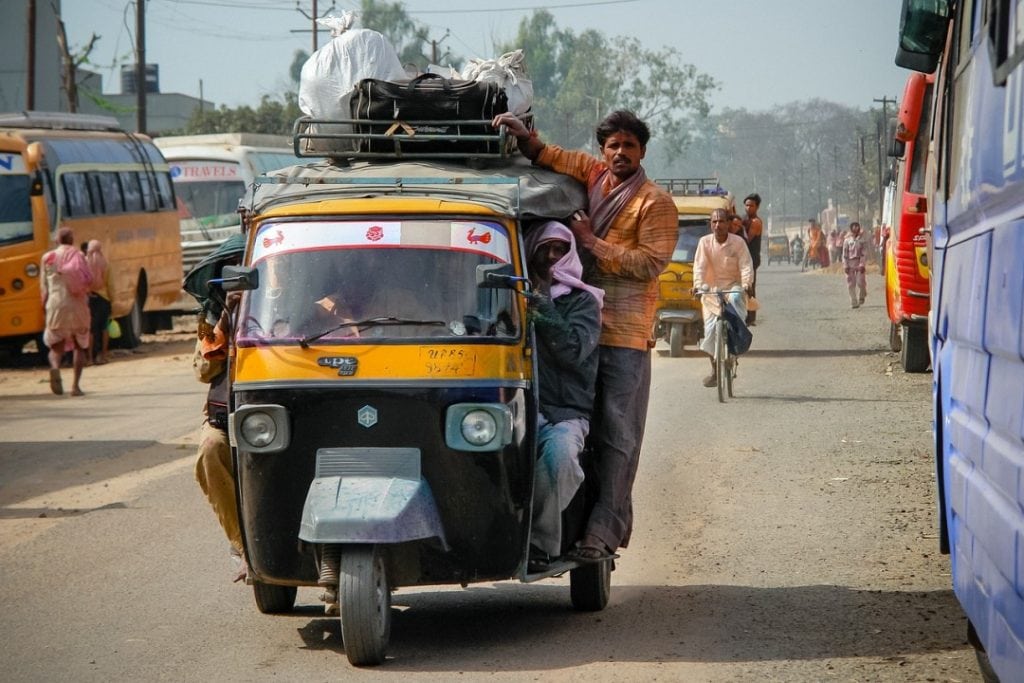
Many of these tricks do happen all over the world but I’ve never been anywhere else where they are as prevalent and aggressive as in India. Luckily, all of the trouble I encountered was just mental hassle and not violence. I mean, why honestly rob people if you can just scam them out of all their money?
Here are some of the most common tourist scams in India:
- Fake tours. Fake travel agencies in India might far outnumber the real ones. You pay a pretty penny for a complete holiday package – I’m talking five times what you would pay if you planned it yourself. The tours are not EXACTLY fake… They just don’t involve anything they promised, nor the level of luxury foretold.
- Taking you to the wrong place. Make sure you look at photos and know where you want to end up in before the trip! A tuktuk driver once took me to an “elephant sanctuary” where the animals stood chained up in a little shelter and claimed that the promised “frolicking in the river” meant the pool. (Abusive elephant tourism runs unfortunately rampant in India.)
- Hotel hoax. Your driver will tell you that your hotel is closed, full or burned down (yikes). If you’re suspicious, they even call the place to “confirm” that they’re not full of ish. In reality, it’s all part of the con to take you to their friend’s hotel.
- Fake roadblocks. Usually in connection to the hotel hustle. “Oh, sorry, the road is blocked, can’t take you to your hotel. Let’s go to another hotel instead!”
How to Avoid Getting Scammed Like a Pro
The best way to avoid these tricks is to be aware of them. It’s way harder to get cheated if you KNOW you’re getting cheated. Stay calm and firm, and the swindler will probably drop the act (except for in India; they are very persistent).
Honestly, most travel scams are very obviously just that. That’s why scammers are masters of gaslighting: they try to get into your head and convince that you’re crazy for even doubting them.

Most cons work because you’re distracted, lost, or otherwise out of your head. The perpetrators often push you past the breaking point. Sometimes you give in just because the person has been insistent enough, even if you clearly know that you’re getting taken for a ride.
Scammers are a hassle but they’re not usually violent, even though they can be aggressive and intimidating.
The first rule of staying safe while travelling applies to vacation scams too: trust your gut. If something feels fishy, then it probably is.
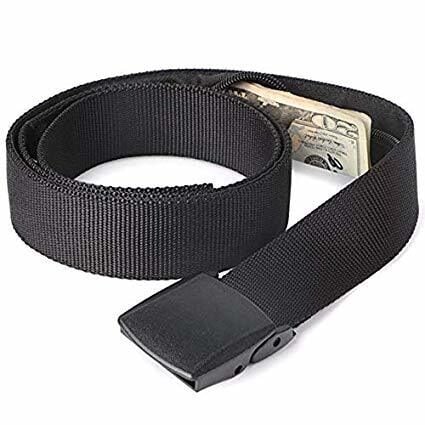
Get your cash stashed with this awesome Pacsafe money belt. It will keep your valuables safe no matter where you go.
It looks exactly like a normal belt except for a SECRET interior pocket perfectly designed to hide a wad of cash or a passport copy. Never get caught with your pants down again! (Unless you want to.)
Hide Yo’ Money!Final Thoughts on Travel Scams
Here’s my final piece of advice, maybe even more important than what I’ve said before…
Don’t let your guard stay so high that you become completely cynical.
Even with all the shitty swindlers out there, most people are still good. I know from experience that it’s easy to become very guarded when you’re travelling to avoid getting cheated. But this is not going to help you in the grander scheme of things.
When I travelled in Myanmar, I was on my tippy-toes for the first week. A trip to India the year before had taught me to be wary of anyone who seemed overly nice towards me. After a while, it hit me, though: people in Myanmar simply WERE that lovely. No games, no cheats, just curiosity and friendship.
And then I felt terrible. I had let my mistrust get in the way of genuine connections.
Maybe it’s even better to err on the side of caution-to-the-wind. Even if you do get cheated, those people might need the money more than you. They’re not out to specifically ruin your day. Usually they are people doing everything they can to survive with the crappy cards they’ve been handed in life.
Getting scammed sucks. But unless you’re in danger or lose all your money, it’s best to just let these mishaps slide off your back. You’ll grow through that.
And in the end it’s just another day, another story.


And for transparency’s sake, please know that some of the links in our content are affiliate links. That means that if you book your accommodation, buy your gear, or sort your insurance through our link, we earn a small commission (at no extra cost to you). That said, we only link to the gear we trust and never recommend services we don’t believe are up to scratch. Again, thank you!






